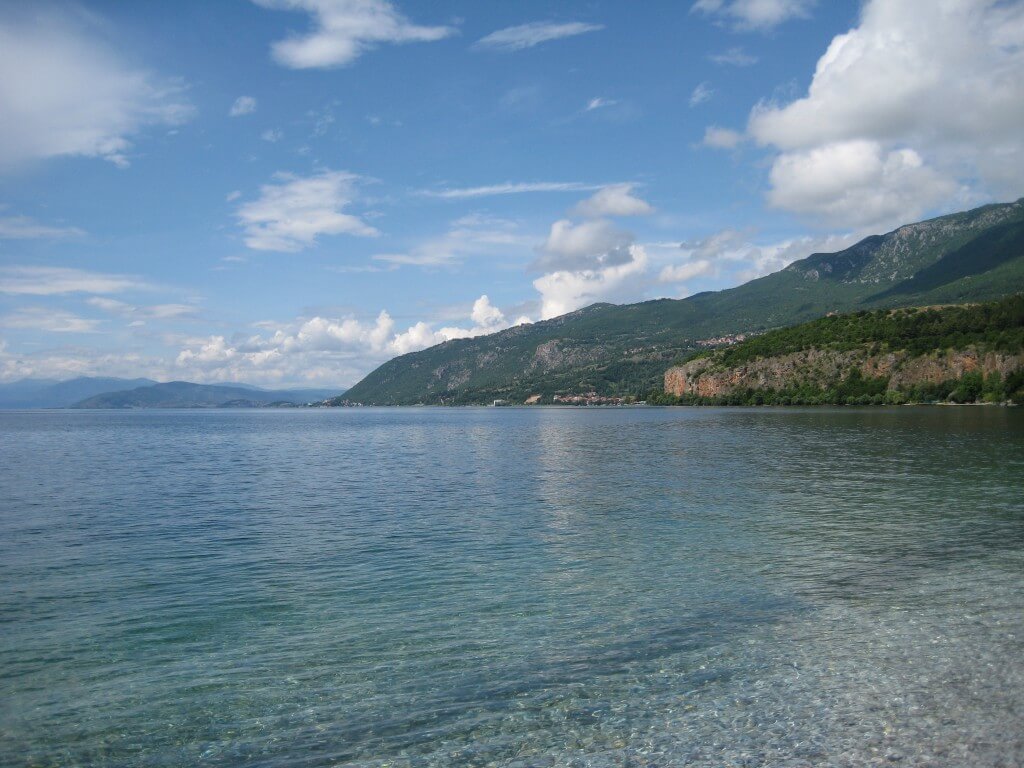Lake Ohrid, Site of August FINA Grand Prix, Under Ecological Attack

By Emma Merrill, Swimming World College Intern
Lake Ohrid, the annual site of August’s FINA Open Water Grand Prix, is under ecological attack. A recent 10-year urbanization plan threatens to seriously impact the Macedonian lake’s water quality and clarity, not to mention destroy an ecosystem of global scientific significance.
To combat this potential ecological destruction, concerned citizens founded Ohrid SOS, an organization dedicated to saving the lake and surrounding marsh. Already over 200 scientific experts in fields like biology, limnology, and ecology have signed an Ohrid SOS Declaration to the Macedonian government calling for an end to the urbanization plan.
Plus several prominent Open Water swimmers such as Xavier Desharnais, Damian Blaum, Zaira Cardenas, Alexander Studzinski, Brian Ryckeman and Esther Nunez Morera have recently promoted a public petition to save Lake Ohrid through Twitter which has garnered over 10,000 signatures. Ohrid SOS has contacted FINA about the urbanization plans, but received a disappointingly weak response.
How the Plans Affect the Lake
The urbanization plans directly target Studenchriste Marsh, the lake’s last wetlands and a natural water filter, by proposing to concrete over the marsh and build hotels, a waterpark, and a marina. Basically these government-backed plans are another instance in which nature is threatened by mass tourism.
Lake Ohrid has been called the European Galapagos for a reason. The spectacular lake, which has been a UNESCO World Cultural Heritage site since 1979, is home to millions of years of unbroken ecological development typically impossible in an average lake. Its unique geological characteristics have helped Lake Ohrid survive the sedimentation process that dooms other lakes and made its waters home to over 200 distinct species. Ohrid SOS’s petition to Macedonian government officials points out the history, archaeologic finds, natural beauty, and culture that characterize the lake.
Ohrid SOS explains the affect the plans will have on the lake in terms of an analogy, saying that the marsh functions for the lake like how a heart acts for humans.
Dr. Tobias Lenz, a Group Leader in Evolutionary Immunogenomics at the Max Planck Institute, who signed the Ohrid SOS Declaration has said,
“Pristine ecosystems such as Lake Ohrid and Studenchishte Marsh provide a unique opportunity to study the natural history of our planet. They harbor biological diversity that needs to be protected at all costs, not only because it is the basis for life on earth, but also because it may provide information and cues towards medical therapies and biotechnological innovations of great economic value.”
If these plans are carried out, here are some of the consequences for Lake Ohrid and the surrounding marshland.
- Breeding grounds of key species ripped out
- Water currents disturbed
- Non-native species introduced (think rabbits in Australia, the comb jellyfish in the Black Sea, etc.)
- Bird habitats destroyed
- A 14km expressway cut through sensitive land
- Anthropogenic stress like sewage, litter, and run-off into the lake would most likely increase
Do you like increased anthropogenic stress?
What about increased anthropogenic stress on the oldest and deepest lake in Europe?
No? I didn’t think so.
The International Society of Limnology, SIL News, published an article on the subject earlier this summer noting that “a more ecologically insensitive notion of economic expansion in a less appropriate location is scarcely conceivable.” In fact, the SIL News article suggests that the Macedonian government could actually reap greater profits in the long run by refocusing on educative and scientific tourism rather than just ripping apart the lake and marshland now.
Ohrid SOS has already reached out to SIL members in the hope that their authority can help prevent this environmental disaster. Now it’s time for the swimming community to show its support too.
Preservation Is Relevant To The Swimming Community
The swimming community must get involved in protecting this unique ecosystem. First off, it’s just in our own best interests to preserve the site of the August FINA Open Water Grand Prix event. Daniel Scarry of Ohrid SOS has said that given the circumstances, an ecological meltdown is possible. Clearly this would spell the end of a quality swimming environment.
For open water swimmers, Lake Ohrid has made for an excellent course since the first competition held there in 1924. The lake saw its first open water marathon in 1954 and its first ultra marathon race in 1962. Its 33km course is ranked high on lists of the top open water swims in the world. It would be tragic if pollution from the proposed urbanization marred the swimming conditions in such a historic venue. Evgenij Pop Acev commented on his dismay at the urbanization plans, saying,
“The protection of Lake Ohrid is important for my sport because swimmers want clean water, which makes the race more beautiful. Like that, the Lake Ohrid marathon would remain the competition with the best conditions and water in the whole world. I think other swimmers would agree.”
But, even beyond Lake Ohrid’s use as an open water location, the lake’s biodiversity and unique ecology make it imperative that the urbanization plans are stopped. While FINA certainly must respond more strongly to the threatening of the lake and surrounding marsh, the swimming community must also spread awareness of Lake Ohrid’s tenuous situation to help prevent this act of ecological terrorism.



